Issue No.11 / July 16,2015
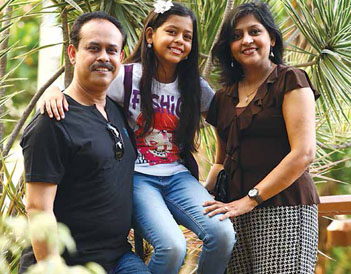
The interesting lesson I learnt at OTA was that there were different people who had different points of failures and successes. As a team though, we would help each other and make sure we all passed and qualified for everything. We came with a lot of weak spots, but we passed out very strong as a team. That was the first lesson of comradeship and team work that I learnt in the armed forces.
Stalwart corporate leader Manoj Biswas who was, until recently, Managing Director- Human Resources, Geographic Unit HR Lead, Accenture India and South Asia served in the Indian Army as a Short Service Commissioned Officer before he joined the corporate world two decades back. Biswas, who held top positions in leading corporates like Wipro and IBM, pioneered large scale HR recruitment and strategy in India with innovative techniques that made the process quick, efficient and effective. Biswas credits his successful corporate career to his training in the Army, which adopted techniques of organisational skills, time management, effective communication, camaraderie and transparency long before the corporate world knew of it. Biswas adopted these impressive techniques in his role as corporate leader. Biswas pursued MBAs from both IIM Kolkata and the Indian Institute of Foreign Trade before he entered the corporate world after quitting the Army. In an in-depth and insightful interview to Corporate Citizen, Manoj Biswas speaks about how he injected the military spirit into the corporate world. This is the first in a series of interviews of corporate leaders who stirred out of their Armed Forces outfits to pursue effective leadership roles in the corporate field.
Manoj Biswas:
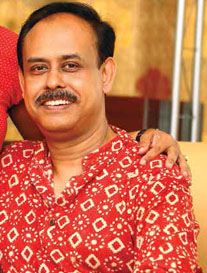
I was born in Dehradun, then small town, now the capital of Uttarakhand. It was a small hill station, renowned for its public schools and the presence of the Armed Forces. The environment around you influences you. The presence of the Indian Military Academy (IMA), the Air Force selection board and the cantonment naturally got me and my friends attracted towards a career in the Armed Forces. So, getting into the Army was quite naturally my first choice.
I got selected in the first attempt in the Combined Defence Services Examination and could either join the Officers Training Academy (OTA) or the IMA. The OTA session was more convenient as I was finishing college and then join the OTA in the August/ September 1988 academic session. We were quite a few classmates from Dehradun in that batch and initially it felt it like an extension of college. As the training programme progressed there was more seriousness, rigor and discipline. For example, I was doing fine in most activities and academics. But swimming was a major stumbling block. Every time I got into the swimming pool I would fail. The instructor decided he had enough and pushed me into the deep waters. I struggled and in the process, learned the hard way that when you push somebody into the water, it is akin to actual ‘training on the ground’ as we call it.
The interesting lesson I learnt at OTA was that there were different people who had different points of failures and successes. If I was bad at swimming, somebody else was bad at something else. As a team though, we would help each other and make sure we all passed and qualified for everything. We came with a lot of weak spots, but we passed out very strong as a team. That was the first lesson of comradeship and team work that I learnt in the armed forces.
Three things. First, I don’t feel successful. Even today, I am open to learning from any age group, from Google or even from my daughter.

For an outsider, somebody else’s career graph looks as if it is going diametrically straight upwards but actually if you look deeper, it is made up of a series of peaks and troughs. What people manage to see are the higher points of your success graph. To them the success journey looks like a plane taking off, but actually it is an undulating trough.
The third and most pertinent lesson I learnt from the armed forces is to hire great teams. Great teams make you successful. Most of us try to hire those who are very much like ourselves. Why? Because we want no confrontation - I will tell, and the person will execute; no conflict. I like to see my face in the mirror so I hire people like myself. The success factor is about having the courage to hire people who are diverse and in many cases better than you, that’s the success of a leader.
I am an HR and business person; my wife is a finance person. We don’t have any commonality -- whatever her strengths are, they are not mine, whatever my strengths are, they are not hers. That’s how a team should be - they should be complementary to each other, because great teams never fail.
ne of my commanding officers once told me that the difference between a successful horse rider and an unsuccessful one was very straight and simple. The successful guy had the courage and passion to brush and dust his clothes and get back on the saddle after he had a fall. At which point of time do you decide not to climb back on the horse? As you go through all of these falls, there are different decision points. The question is where do you lose it and say ‘now I am not going to get back on the horse’ ?
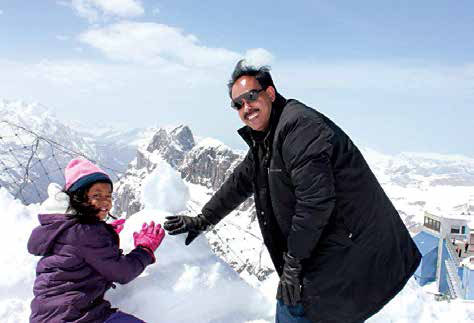
The world is constantly changing. The only thing that is consistent in our life is change. What is new is the velocity of change. If the radio took 38 years to get to a listener base, or a customer base of two million, Facebook took one year, Twitter probably took less than a year. Candy Crush, the game that our kids play - some of us who are not so old still play it - garners a revenue of USD 268 million every month. Would you have thought 20 years back that a video game would give you that kind of a turnaround story?
I was at a tech conference about five-six years ago. One of the guest speakers said imagine that your mobile phone is the only device you will require in the future. It will be your computer, your laptop, your music device and a substitute for your camera. There was a murmur of laughter that went through the audience. Five years down, you probably are sitting with a mobile phone which does everything.
So what can surprise young managers of tomorrow is not change; it is the velocity of change. The number of changes that will hit in a matter of months or a year, will be manifold than we see today. People need to get comfortable living in an ambiguous time full of changes. They need to get out of this phobia of fear; they need to be confident about themselves and their capabilities to help them manage and be successful in the turbulent times.
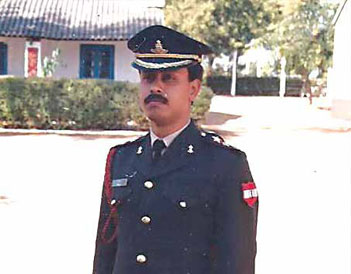
The only adversity was the climate. When you are serving at the highest battlefield in the world at minus 55 degrees centigrade, adversity teaches you to respect your training. It actually puts to test your training and how good you have learnt. It also teaches you to trust your friend, teaches you why people are tied to each other when you are going out -- if somebody falls into a crevice or there is an avalanche, others can pull you out. The level of comradeship seen on the glacier is probably the highest. Imagine, at that point of time I was getting paid around Rs 1800 per month, and I am sure if an officer was getting paid so modestly, the jawans were getting far less. Showing such comradeship requires the highest level of personal motivation and guts.
What did the tenure teach me? In the corporate world, when things go wrong, you need somebody with a cool head. I guess that was one of the big lessons I learnt in my army tenure.
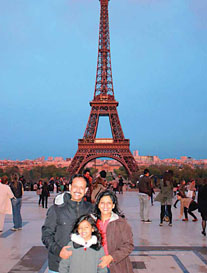
I was very lucky to share my room with a postgraduate in Mathematics from Venkateshwar College, Delhi. In those days, when computers were not so widespread, he had a small hand-held computer which he used for basic programming. I was very fascinated by that because in those days in 1989-90, the army had not even seen a computer.
During this time we thought that if this firing is all about mathematics, why we can’t program it on a computer. One of our senior instructors encouraged us to change our firing programme from large plotting boards to a hand-held computer. Thereafter we never looked back and that’s how our life changed.
That was the genesis as to why I quit the army, after serving for seven years. I pursued my MBA because of an accident. I had injured myself while playing hockey in the armed forces and I had free time. I was in plaster for almost a year. Thereafter, I came to Delhi, joined the Indian Institute of Foreign Trade and pursued MBA in marketing through the 18 month executive MBA course. Interestingly, I met people from leading corporates like Ericsson, L&T and others from different walks of life. That’s where I started to learn that the world outside was going ahead and IT was taking shape and creating an impact. I went back and put in my papers. Then, before my stint at Wipro, I appeared for CAT and got admission at IIM Kolkata where I pursued my MBA.
In 1995-96 I started looking for a job in marketing. Unfortunately whenever people saw I had done a tenure as a short service commissioned officer, they would offer me a job in administration or security. I did not qualify for over 37 interviews and was not even short-listed for several. One of my mentors from the business school advised me not to fight the system. He suggested I get into Human Resource, since that is aligned to the interest I had shown and the market would aptly perceive me. That was how I got into HR and subsequently became a business analyst. Then I worked for North Carolina (US) based Intelligent Information Systems, which had a presence in India.
I went to the US in 1998-99, for about three and half years and worked on designing software to facilitate e-governance for the US government. As a product manager, I designed software products in the financial services and tax collection system for the state and county governments in the US. That is how the transition happened and I came back to India in 2001 post the Y2K, when I met Raman Roy. He had created American Express and GE India. Raman then started his own company, Wipro Spectra Mind. It was a very small outfit in Okhla Industrial Estate, but he had a big vision, to make it a 10,000-people company. I was offered the role of recruitment lead for Wipro Spectra Mind. Raman wanted an unconventional HR recruitment person, so he shortlisted me.
In just about a year and a half, Wipro Spectra Mind grew to be a 15000 people- company, the largest third party service provider in the country. It became a huge success story, creating a lot of innovative practices.
Secondly, I did not get typical HR people as recruiters. Women in BPOs left after they got married because of the night shifts and looked for other jobs. I got them to be my recruiters. They knew the business, they knew what was required, what were the metrics, what were the basics. All they required was a basic interviewer certification. So Wipro put up a certification program in place, they got certified, joined my team, interviewed candidates and made the offers, there and then. It made my interview process much faster. They were happy, working regular hours, not night shifts, doing an HR job. You have tremendous attrition in BPOs, but nobody left me, at least until I was there.
Post Wipro Spectra Mind, I met the HR head of IBM India. He asked me if I could replicate the Wipro Spectra Mind BPO pattern at IBM which wanted to be a truly services company. They aimed to grow very fast by creating a talent supply chain. I agreed. At its peak, we recruited anywhere from 25000 to 30000 every quarter. We created a supply chain, robust and growing. IBM India, from 2003 to 2007, was the fastest growing MNC in India.
In 2005-2006 after a lot of recruitment, I requested the leadership for some other responsibility and I was offered charge as HR Head of all of the technology business of IBM. This was a most complex business as the IBM research laboratories and the Global Delivery Service business involved large scale hiring. I did that for quite some time and in 2006. Accenture approached me with an offer. I joined them as HR head in 2007 and was thereafter made Managing Director- Human Resources, Geographic Unit HR Lead, Accenture India. I recently quit the company.
When you are serving at the highest battlefield in the world at minus 55 degrees Celsius, adversity teaches you to respect your training. It actually puts to test your training and how good you have learnt. It also teaches you to trust your friend, teaches you why people are tied to each other when you are going out -- if somebody falls into a crevice or there is an avalanche, others can pull you out. The level of comradeship seen on the glacier is probably the highest.
I met the then HRD minister as part of the National Skill Development Corporation of India (NSDC). A McKinsey study indicated that we had 500 million graduates passing out every year, but only 25 per cent got jobs. That’s the divide we have not been able to bridge. Fifty per cent of graduates pursue higher studies or get into education programs abroad. Only 25 per cent make the cut, the balance 25 per cent go to the likes of NIIT and Aptech making their revenue model. So the finishing schools need to balance out that divide. That will be the bigger change that India needs to see in the future. If the government, the corporates, and universities work in tandem, it will happen. The problem is that all of us are like the blind men who guess the elephant, we just see our part of the sector, not the elephant in totality.
There are lot of things in the armed forces which can be replicated, because HR practices are implemented in the army. Your training, your refresher training, your buddy system, your team building exercises, your learning and growing gradually through each of the levels, your career progression plan, your performance management system -- all these existed in the armed forces long before the corporate world even talked about it. The Indian Armed Forces is the largest human resource organization that runs 24x7. If you look at the compensation structure, the basic payroll structure, the incentives – all of these too have been created in the armed forces. They need to be modified and fitted into the corporate world.
When new recruits join, they feel lost, in any big organization. The first 90 days are very crucial to learn the organization language, learn the culture, understand, get some help. That’s where I introduced the buddy system which exists in the armed forces. The moment you get an offer letter you get a mobile number, an email ID, to say this person would be your buddy for the next 90 days. The buddy will call you and say this is your joining location, this is my workstation number and I am available for you. The buddy goes with you, takes you to the cafeteria, tells you where to get the stationery, tells you how you will get the security card, and helps you with your laptop, and anything and everything that goes wrong. The buddy is there to help you and he is like your mentor, guide, administrative help to negotiate in this large corporate. After we introduced this system, the response of the people was very good.
I also began the system of townhalls. It is a simple thing - you go to a cafeteria, there is a small stage and you share the details of the last quarter and what is going to happen in the next quarter. What kills people is lack of information. Employees today are very intelligent. They want to know how they perform; how did their work contribute to the success of the company. They ask questions. If you do not answer questions, if you do not set the right expectation, that is where rumours come - they become Chinese whispers and people start discussing them. Then it leads to disgruntlement. If you stand up amongst them and provide information, you are setting the expectation, which is done very well in the armed forces. Before you go to war you tell them you need to do this, do that, this will not happen, this is the only food you will have, and this is the amount of water - that is, expectation setting. It can be difficult, but people know why you are doing it, and they know beforehand, so they are prepared. They don’t crib about it, they don’t complain.
At many townhalls I have admitted I didn’t know the answers to their questions. I see people take that at face value. When I came in, I was told how large we were, so it was difficult to have townhalls. I started using technology, I used something called a round table and I gave video access to team leaders. So whenever I did my townhall, I connected on the video. There is a chat box where people asked questions. This was held in all locations.
I also ran a program called `Mornings with Manoj’. People who are five-ten levels below me never got to meet or interact with me and I don’t get to hear from them. So we have a coffee morning, a very informal set up, where everybody sits around with coffee and cookies. A random 15-20 people are invited. I run a very small video to do the expectation set ting and tone of the meeting, and then I just listen. After I go back from there I used to send the minutes of the meeting to everyone who was present. This is what I tell them – you told me these 15 things, of these, three things I believe are priority, and I will do this by 1st or 2nd quarter of this year. These other three things that you told me, are very good ideas, but I don’t have the time, so why don’t you do something? I will create a focus group and fund you, and you come back with a recommendation of what we should do. I used to get great feedback from some of these meetings.
In the US or Europe, almost 45-50 per cent of people who come out of the armed forces get direct admissions to the best colleges like Harvard or Cornell University, and it is paid by the government. They also get the best of the jobs. If you look at Accenture, Fujitsu, 3M, McKinsey, some of the top jobs at the director level etc., are with people from the army. But in our country it is different. If you are able to create the same kind of environment, imagine the kind of talent that will come in. The task is to get people not by force but by making it attractive
The whole concept of the armed forces revolves around HR. When I joined the armed forces the first thing my commanding officer did was give me a notebook and tell me a few things. He said, you are in this regiment, you should try to meet 5-10 jawans everyday. Know everything about them, their names, what they do, where they come from, their village, who are in the family, what do they value, and what they looking for. Talk and listen to them and note it down, try to memorise it. If you know them well and are able to address them by their name, whenever the situation comes you will know their family members, you will know their situation, and then take the decision. They will respect you for that. Communication is 70 per cent listening and 30 per cent speaking. Unfortunately we confuse communication skill as an ability to speak.
When I was at the OTA they told me an officer’s training is tougher than that of a jawan. An instructor told me, “When you go to the unit as an officer you no longer do these things, you will no longer dig a pit with your own hands, or do any of these menial things. You will give the order and somebody else will execute it. But before you give an order to say, dig this pit by so and so time, you should know how much time it takes.”
This is a great time to be here, in India. The opportunities are limitless. Today’s youth is highly intelligent, highly innovative, and there is lot of me-ology (what is in it for me?) with this generation. That is critical. If you lack self-belief, if you are not innovative, you are bound to fail. What the youth have not experienced is what they need to do for the other two pieces -- the society and the country. There is lot of the middle phase -- the ‘me and my family’ that is taken care of.
The youth plays a very dynamic role in a country’s future. If a university can provide ten successful people who can write the future of India very differently, that is the biggest social contribution a university can make. Our generation and a generation us before went through the independence struggle, so then it came naturally. This generation has not seen that struggle. Somewhere, the connection with the country is missing, not in totality but in quantum.
People should not be forced, then you don’t see value. If the army has to attract good people to join, the responsibility is with the army, not with the youth. The army has to make itself visible and marketable.
In the US or Europe, almost 45-50 per cent of people who come out of the armed forces get direct admissions to the best colleges like Harvard or Cornell University, and it is paid by the government. They also get the best of the jobs. If you look at Accenture, Fujitsu, 3M, McKinsey, some of the top jobs at the director level etc., are with people from the army. But in our country it is different. If you are able to create the same kind of environment, imagine the kind of talent that will come in. The task is to get people not by force but by making it attractive.
If you join the armed forces you will always be fit and trim. It teaches you the regimented way of living.
I have become much more humble, much more innovative and adaptive. I love to get into challenging and ambiguous spaces, but I am more grounded that I was. There is a couplet by the poet Kabir which says that the real test of a tree comes when the tree bears fruit; that’s when it is of value to society. When it bears fruit, you can see it actually bend towards the ground, it doesn’t stand straight.
The most pertinent lesson I learnt from the armed forces is to hire great teams. Most of us try to hire those who are very much like ourselves. Instead, hire people who are diverse and in many cases better than you - that’s the success of a leader
It was a perfectly arranged marriage but had to wait for some time, due to professional commitments of both, Shibani and Manoj Biswas. Although they met each other for the first time in 1999 and had liked each other, they did not commit. The decision got postponed further, when, Shibani, who was working with American Express, Noida, got a posting to London and decided to go. Manoj, who was working with Wipro also was posted to the US.
Reminisces Shibani, “I had finished my CWA and my parents wanted me to get married. I met Manoj but thereafter, I went to London and nothing moved, although we were in touch with each other. My parents wanted me to come back to India and get married, so I decided to return in 2001, which is when we got married.”
States Manoj, “We had a very long distance international relationship but at some point of time we both decided that we should come back home and get married. We were very socially oriented and hence found ourselves a little disconnected from the social stand point. That is when we decided to come back to India and get married and so I came back from the USA in 2001.”
So, what was Shibani’s first impression of Manoj? Says she, candidly, “At that point of time I saw him as a very confident, dynamic, outgoing person and one with a vision. I was amazed at the career path he had envisioned. He was from the army and although he had left it when we met, he was still army-like. One does not see that kind of chivalry and gentlemanly behaviour, especially in today’s corporate world. The army teaches them to respect women.’’ As for Manoj, he found Shibani to be a very cool and composed person.
Married for 14 years now, with an 11 year old daughter, Ipshita, the relationship has been one of mutual understanding, not only in the personal front, but on the professional front too. Like, when their daughter Ipshita was three years old, Shibani, who was still working with American Express, was posted to Hong Kong and Manoj took it upon himself to look after her. Says Shibani, “We tried to work out a solution where by Manoj who used to travel a lot, spent ample time with Ipshita, during my Honk Kong tenure. We were also staying with my in-laws, which helped further in making Ipshita feel secure. To stay out of the country for six months was not easy, especially when you have a child back home, but Manoj and his parents made it possible for me.’’
She adds, “There have been moments when I felt proud as well as guilty during my career. Especially when I was in Hong Kong, I felt guilty and would cry at times. That was the weak moment of my life. But when I look back, I see the strength I had to hold through it and the family support I got.”
By 2007, Manoj moved to Bangalore and Shibani decided to give up her job, as motherhood overpowered her desire to be a careerist. Says she, “I wanted to be a hands- on mother and so quit. Ipshita was growing up and I decided to enjoy other aspects of life as well.”
So, was it easy to switch over from a working woman to a complete homemaker? Says Shibani, “I must confess that leaving work and being a homemaker was a trauma for me and at times I also felt it was not the correct decision. We stayed in Bangalore for 2-3 years after which we moved to Manila, as Manoj was posted in the Philippines in 2009, with Accenture. We were there in the Philippines for 3-4 years. I had a different exposure to life there. Being an expat I was in contact with all the CEOs and their families. I also joined the Indian women’s association called Bharti, which was headed by the wife of the Indian ambassador. I contributed a lot to the social cause, through fund raising events for the orphans in the Philippines community.”
Manoj is very much a go-getter and outspoken while I am the opposite. He likes to explore various things. In contrast, I am detailed-oriented. Hence, we’ve created a fine balance which makes for a complete picture- Shibani
Manoj and Shibani make sure they spend time with Ipshita. Says Manoj, “We are committed to spend more quality time with Ipshita and we have our weekends set aside for that. We like to do simple things, like going out for a movie whenever there is a kid’s movie around and other activities.’’ Adds Shibani, “Every two to three months we like to go out for a vacation. I still like to be in control of home, her studies and her activities. I personally sit down with her and take care of her studies, instead of outsourcing that part. Now as she is growing up it has become a little more difficult for me to handle, but as of now I am trying to do it myself.’’ Shibani presently is busy, embarking on a venture.
As for the marriage, being different in nature and approach has helped in its stability, togetherness and enrichment. Says Shibani, “Manoj is very much a go-getter and outspoken while I am totally the opposite. So we complement each other. He is a more dynamic person and he likes to explore various things. In contrast, I am detailed-oriented, and think deeply before I take a decision. I like clarity while Manoj goes by his gut feelings. Hence, we have created a fine balance which makes for a complete picture.
We are also each other’s best critic. We definitely do get into arguments. As we are critics of each other, we do criticize on a lot of things on a day-to-day basis, which I feel is a sign of healthy relationship.’’
They are poles apart in their likes and dislikes too. Manoj is fond of home food while Shibani loves to explore outside food. As for holidays, Manoj is not too choosy, says Shibani , so she is the one who plans the holidays. Says she, “I like to explore hill station-kind of places. My favourite destination would be Switzerland although I have been there only once.”
So, what is the philosophy that Shibani lives by in marriage? Says she, “Live and let live is my philosophy. Enjoying life in the true sense is what I want to do. We have our difference of opinions in life, but what holds us together is the trust we have in each other. The trust is the love and respect we have for each other. The trust factor is the basis of any relationship.’’
Hence, her advice for young women is, “Everybody needs to take charge of their life and accordingly it is a situational thing. Being experienced in every aspect of life, I would say career is very important, but so is family life. I see a lot of women postponing marriage, because career is a priority these days. But other aspects of life are also important. There is so much of stress in today’s corporate life, but it is quite possible to balance it out. Not that everybody should leave their jobs and go the family way but every aspect of life needs to be enjoyed.”
By Vinita Deshmukh